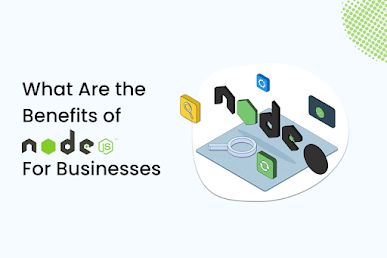Unveiling the Advantages of Node.js for Business Growth
In the ever-evolving landscape of web development, Node.js
has emerged as a powerful tool, revolutionizing the way businesses build and
deploy applications. With its event-driven architecture, lightweight footprint,
and extensive ecosystem, Node.js offers a myriad of benefits that can propel
businesses to new heights of success. In this blog post, we'll delve deep into
the advantages of Node.js for businesses and explore how it can drive
innovation, efficiency, and growth.
Stats
for Node.js Market
Statista
reports that Node.js has eclipsed React.js as the most widely used web
framework.
React.js is
used by 40.6% of respondents, whereas Node.js is used by 42.7% of respondents.
The trend of businesses hiring Node.js engineers for their projects makes
sense.
In the
section below, we'll discuss some of the numerous advantages of NodeJS for
businesses, such as scalability and performance improvement.
You'll see
why it can be the greatest choice for your company's needs after you understand
its benefits.
Top
Node.js Benefits for Businesses
You are
aware of Node.js's meteoric growth in popularity.
It has been
shown to be lightweight, rapid, and reduces time to market. Let's take a closer
look at how NodeJS could benefit companies. Understand the factors that
contributed to its appeal.
1. 1. Scalability: One of the most significant
advantages of Node.js is its scalability. By leveraging its non-blocking,
event-driven architecture, Node.js allows businesses to handle large volumes of
concurrent connections with ease. This makes it ideal for building real-time
applications that require high levels of performance and responsiveness, such
as chat applications, online gaming platforms, and streaming services. With
Node.js, businesses can effortlessly scale their applications to meet growing
user demand without compromising on performance.
2. 2. Speed and Performance: Node.js is renowned for its
blazing-fast performance, thanks to its single-threaded, non-blocking I/O
model. Unlike traditional server-side technologies like PHP or Ruby on Rails,
which rely on synchronous processing and blocking I/O operations, Node.js
executes JavaScript code asynchronously, allowing multiple requests to be
processed simultaneously. This results in faster response times, reduced
latency, and improved overall performance, making Node.js the platform of
choice for high-performance web applications.
3. 3. Rich Ecosystem: Node.js boasts a vibrant and
diverse ecosystem of libraries, frameworks, and tools that streamline the
development process and enable developers to build feature-rich applications
quickly and efficiently. From Express.js for building web servers to Socket.io
for real-time communication and MongoDB for database integration, Node.js
offers a wealth of tools and resources that empower businesses to build robust,
scalable applications tailored to their specific needs.
4. 4. Cost-Effectiveness: In addition to its technical
advantages, Node.js also offers significant cost savings for businesses. Its
lightweight footprint and efficient resource utilization mean that businesses
can achieve higher levels of performance with fewer server resources, reducing
infrastructure costs and operational expenses. Furthermore, Node.js's
non-blocking, event-driven architecture enables developers to write code that
scales easily, minimizing development time and reducing time-to-market for new
applications.
5. 5. Community Support: Node.js benefits from a thriving
and active community of developers, contributors, and enthusiasts who
collaborate on projects, share knowledge, and provide support to fellow
developers. This vibrant community ensures that Node.js remains up-to-date with
the latest trends and best practices, while also providing a wealth of
resources, tutorials, and documentation to help businesses get started with
Node.js development quickly and easily.
Let's
contrast Node.JS with Other Technologies.
With so
many other technologies on the market, why choose Node.js? To have a deeper
comprehension of it, let us draw some analogies with other technologies. Let's
begin as soon as feasible.
1. PHP
vs Python
->
Performance :-
Node.js tends to perform better than Python for I/O-bound applications and real-time systems due to its
non-blocking architecture. However, Python's performance can be comparable or
even superior for CPU-bound tasks and complex mathematical computations.
->
Scalability:
Node.js is highly scalable, particularly for applications requiring handling
large numbers of concurrent connections. Python's performance may degrade under
heavy loads, especially with synchronous processing.
-> Ecosystem:
Node.js has a rich ecosystem of modules and libraries tailored for web
development, including Express.js for building web servers and Socket.io for
real-time communication. Python boasts a vast ecosystem as well, with libraries
like Django and Flask for web development and NumPy and Pandas for data
analysis.
2.
Node.js vs. PHP
->
Performance: Node.js typically outperforms PHP for handling concurrent
connections and I/O-bound operations due to its non-blocking nature. However,
PHP can be more efficient for CPU-bound tasks and traditional web applications.
-> Ecosystem:
Node.js offers a modern and extensive ecosystem for building web applications,
with frameworks like Express.js and NestJS. PHP has a large ecosystem as well,
particularly for CMS platforms and e-commerce solutions.
-> Language
Features: Node.js uses JavaScript, which is asynchronous by nature and
enables event-driven programming. PHP is synchronous by default but offers
asynchronous capabilities through extensions like ReactPHP.
3. Node.js
vs. Java
-> Performance:
Node.js tends to be more lightweight and performant for handling I/O-bound
operations and real-time applications. Java's performance is excellent for
CPU-bound tasks and enterprise-level applications, particularly with
optimizations like Just-In-Time (JIT) compilation.
-> Scalability:
Node.js excels in handling large numbers of concurrent connections and is
well-suited for microservices architecture. Java's multithreading capabilities
make it scalable as well, particularly for enterprise-level applications
requiring complex business logic and transaction management.
-> Development
Speed: Node.js offers rapid development cycles, thanks to its
JavaScript language and extensive ecosystem of modules and libraries. Java
development may require more boilerplate code and setup but offers robust
tooling and frameworks like Spring Boot for accelerated development.
Popular
Companies Using NodeJS :-
Netflix,
Uber, Walmart, Twitter, PayPal
Where is
NodeJS most useful?
Node.js, a
powerful runtime environment built on Chrome's V8 JavaScript engine, offers a
plethora of benefits that make it highly useful for businesses across various
industries.Node.js is most useful for businesses in scenarios where real-time
communication, scalability, performance, and rapid development are paramount.
Whether building real-time applications, APIs, microservices, SPAs, IoT
applications, or automation workflows, Node.js empowers businesses to innovate,
scale, and deliver exceptional user experiences across a wide range of use
cases. Let's delve into detailed explanations of where Node.js is most useful:
• Real-Time Applications:
• Development:
-> Node.js is well-suited for building robust and scalable APIs due to its lightweight footprint and high-performance capabilities.
• Microservices Architecture:
• Single Page Applications (SPAs):
• IoT (Internet of Things)
Applications:
• Cross-Platform Desktop
Applications:
• DevOps and Automation:
It seems that you are now aware of some of the benefits that
Node.js provides to businesses. The best NodeJS
development company, Naxtre Technologies, should be included in any ideas
you have.
If you're searching to construct a top website or web app, our talented Node.js
developers are always ready to deliver the best. We can help you pinpoint the
target market and turn your idea into a successful digital product, utilizing
MVP development to the fullest extent possible.
For this reason, we believe that if you have an idea, you should work with us
to get the best user experience and outcomes possible.
In Summary
Now that you know, perhaps you have a better idea of the
range of business advantages that NodeJS provides, which some of the top firms
in the market are already using to improve their client experience.
When everything is said and done, it's a powerful tool for
creating Internet of Things, real-time, and single-page apps. But, you should
assess the advantages and disadvantages to see if it will support your
company's objectives. Additionally, to ensure your place in this dynamic
industry, you should surely seek the help of Naxtre Technologies Pvt. Ltd. if
you wish to completely utilize Node.js.




Comments
Post a Comment